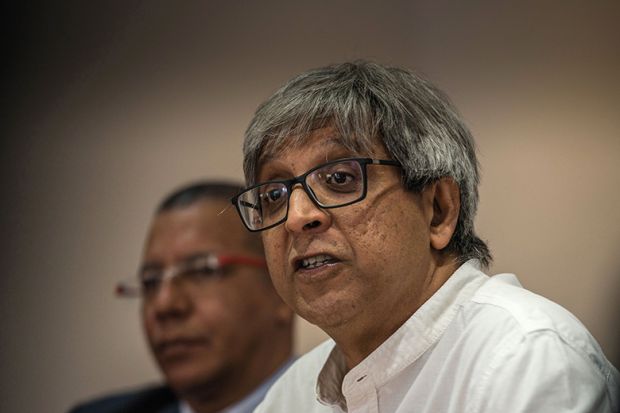South African universities are unlikely to have seen the last of campus unrest despite the abolition of tuition fees for most students, a leading vice-chancellor has warned.
“The primary agents of the protest, which is the young middle class, have not been recipients of the concession,” Adam Habib, vice-chancellor of the University of the Witwatersrand, told Times Higher Education.
Last December, in one of his last acts as South Africa’s president, and after waves of protests that at times paralysed the country’s campuses, Jacob Zuma introduced free higher education for students from households with a combined annual income of less than R350,000 (£19,783).
Mr Zuma said that this would cover “well over 90 per cent of South African households”. But Professor Habib said that while this might be the case on many campuses, at more selective institutions such as Wits or the University of Cape Town only about one in five students will benefit.
The protests “haven’t died”, Professor Habib warned.
“Is there likely to be a movement in the future? Obviously,” he said. “As long as the problem remains, the potential exists. That potential exists around the agents of the social movement; their problems have not been resolved, and [the problem of] accommodation and fees remains and it has to be addressed.
“Unless we find a solution in the short term, that potential will continue to plague us.”
Ideally higher education could be made free for all students, Professor Habib continued, but he questioned whether this could be afforded.
“It seems to me that at some point we have to move towards an income-contingent loan scheme,” Professor Habib said, “but it’s just so politically loaded” in a country in which university access is seen as part of the post-apartheid settlement.
The speed with which Mr Zuma’s fees pledge was rushed through means that funding for South African higher education remains in flux, and this triggered wider concerns for Professor Habib.
The country’s universities currently set their fee levels individually, but discussion has shifted towards the introduction of setting fees at a national level. If this happens, Wits and Cape Town – which have the highest fees – would likely take the steepest cuts. And this would have an impact on the world-leading research that the institutions conduct.
“I am committed to a notion of sustainability in the fee regime. The question is how we do so thoughtfully and in a manner that speaks to our respective mandates,” Professor Habib said. “If you simply take resources from one [type of university] and move them to another, you simply move everyone towards the middle and homogenise our institutions…but society has multiple needs, and different institutions meet those needs in different ways.”
Research is already underfunded in South Africa and universities are overly reliant on outside sources, particularly for health sciences research, Professor Habib continued.
“It will decimate our research infrastructure if we are not mindful about what we do,” he said. “We need to address the systemic challenges in the country. Now they are managing the symptoms of a crisis, but if you want to really deal with the crisis, deal with financing, with quality, with the inadequate distribution of poor and rich and enable institutions to address inequality.”
后记
Print headline: V-c fears ongoing campus unrest




